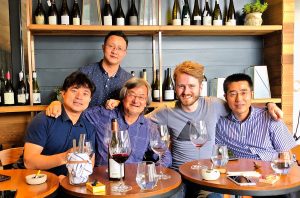

It was a happy coincidence that I bumped into Will McNicol in Chengdu when I was on my way to my Mum’s 96th birthday.
I was met at the airport by Will, Xu Bao and Joshua Jiao and rushed to a restaurant in an emergency food dash.
Will had been touring China with his own super charged yet gentle brand of acoustic music which he played on a new crossover guitar made by Martinez. This is a nylon strung instrument with a longer neck (the neck meets the body at the 14th fret) and a slightly shallower body. Will had just played in Chengdu the night before, following on from ten or more concerts throughout China, ably assisted by Josh.
After a wonderful lunch which culminated in the smashing of a wine glass while I was on a swing (don’t ask) we were joined by Alex Wang, CEO of Martinez. The following, slightly inebriated interview(s) discussing the future of the guitar in China, connections, Will’s music, life, the universe etc followed without further breakages .
A clip from Will’s latest recording

Will was voted Acoustic Guitarist of the Year by Guitarist Magazine in 2011.
Here is his piece “The Wakeup”.

